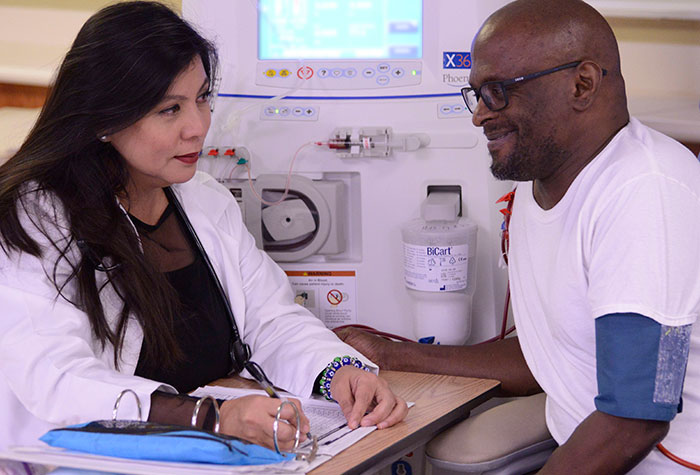Office of Research & Development |
 |


Dr. Adriana M. Hung meets with patient Rodney Stewart at the VA Tennessee Valley Healthcare System. (Photo by Brandon Lunday)
August 16, 2019
By Tristan Horrom
VA Research Communications
"The next steps are to continue to unravel the genetic basis of health disparities for heart disease and chronic kidney disease, beyond APOL1."
In a study of nearly 31,000 African American Veterans—one of the largest genomic studies to date focused strictly on African Americans—VA researchers found that gene variants associated with chronic kidney disease have only a modest link to cardiovascular disease. The study used data from VA’s Million Veteran Program (MVP).
Chronic kidney disease and cardiovascular disease appear to be linked in this population, but the biological drivers of that link are unknown. Dr. Adriana Hung of the VA Tennessee Valley Healthcare System, a corresponding author on the study, explained her team’s key finding this way:

VA Study Documents Health Risks for Burn Pit Exposures

VA center training the next generation of researchers in blood clots and inflammation

Could cholesterol medicine reduce dementia risk in seniors?

VA investigator brings diversity into autoimmune disease research
“The research tells us that patients with APOL1 risk variants . . . do not have extra cardiovascular risk beyond the one conferred by worsening kidney function.”
The results appeared in the July 24, 2019, issue of the journal Circulation.
APOL1 is a gene that makes a protein related to cholesterol. Two variants of this gene, G1 and G2, have been shown to increase the risk of chronic kidney disease in African Americans. When a person has two copies of the gene variants—two copies of G1, two copies of G2, or one G1 and one G2—they have 1.5 to 2.5 times the risk of kidney disease, compared with people without either of the gene variants. About 13% of African Americans carry two of these APOL1 variants.
Previous research has shown that chronic kidney disease increases the risk of cardiovascular disease in African Americans, to a greater extent than in Caucasians. To test whether the G1 and G2 variants of APOL1 also increase cardiovascular disease risk in African Americans, the researchers turned to the large genetic database of MVP.
They looked at the gene sequence and health history of nearly 31,000 African American Veterans who volunteered for MVP. About 13% had two of the APOL1 gene variants, while 47% had only one variant.
Participants with two risk variants had a slightly higher risk of developing coronary artery disease than those without two risk variants. Having two risk variants was weakly associated with increased risk of stroke and peripheral artery disease.
The two APOL1 variants were not linked with any other forms of cardiovascular disease, such as angina.
Study participants with only one risk variant did not have any increased risk of cardiovascular disease.
The results also suggest that the G1 and G2 variants of APOL1 may have distinct effects on cardiovascular disease and cholesterol levels. While this result is intriguing, more research is needed to figure out the actual relationships, say the researchers.
As expected, those with two copies of APOL1 risk variants had a higher risk of chronic kidney disease. Because the link between the APOL1 variants and cardiovascular disease were moderate at best, the researchers suggest that this link could be due to APOL1’s association with kidney disease, rather than its role as an independent risk factor for cardiovascular disease.
This study is one of the largest genetic studies to date involving only African Americans. The sample size was more than triple the size of similar investigations conducted previously.
“The next steps are to continue to unravel the genetic basis of health disparities for heart disease and chronic kidney disease, beyond APOL1,” explains Hung. “Further studies to understand whether there are genetic determinants of cardiovascular risk in chronic kidney disease are underway.”
MVP is one of the largest genetic databases in the world. It uses genetic samples from Veteran volunteers, along with their electronic health records, to research connections between genes and a variety of health conditions. As of July 2019, more than 775,000 Veterans had enrolled. To learn more about MVP, visit the Million Veteran Program website.
VA Research Currents archives || Sign up for VA Research updates